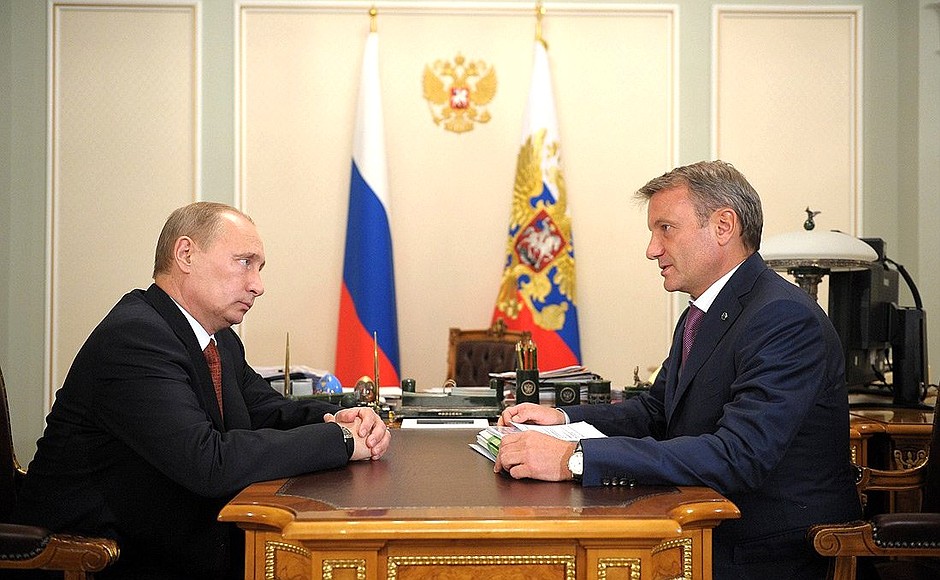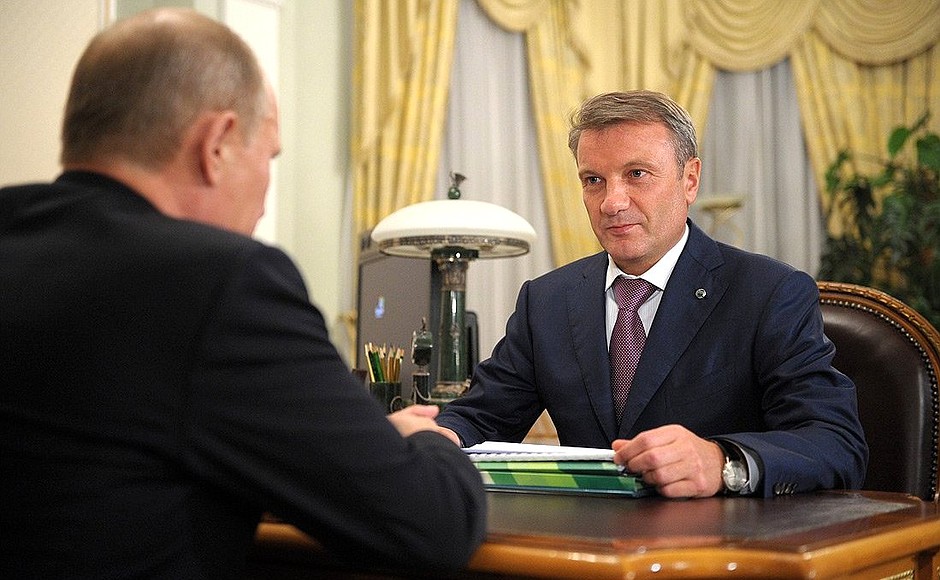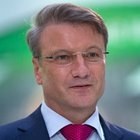* * *
CEO and chairman of the Board of Sberbank of Russia German Gref: Mr President, we have completed our second share placement. The window on the market opened for almost two days and, thanks to the Central Bank and Government’s joint effort, we were able to make the most of the opportunity. The corridor we were working within was based on a target of 5.2 billion at a price of 93 rubles per share. This is higher than the share price for the previous placement (89 rubles per share). This is the biggest privatisation deal in Russian history.
President of Russia Vladimir Putin: You’re referring to the sale of 7,6 percent of our shares?
German Gref: Yes, that’s right.
Vladimir Putin: For every $100 invested 10 years ago, you have now made $3,700, as far as I know.
German Gref: Yes, that’s right. We are second after Apple in terms of yield for the last decade.
Overall, I think this is a very good deal for Russia and it got good publicity everywhere. Despite the big fall following the placement, we are holding stable at around 92 rubles per share. We still have a tough time ahead while adapting to the big number of shares now on the market, but we nonetheless forecast growth. Our fundamental indicators are all in good shape and we expect stable growth through the rest of this year. We will meet in full our obligations to investors.
Vladimir Putin: Good.
How did things go in Turkey?
German Gref: That was difficult work. Unfortunately, we had only a short time and faced stiff competition for this Turkish bank [DenizBank]. We and the National Bank of Qatar were the final contenders in the race to buy what is Turkey’s sixth-biggest bank. The bank is a good and very modern asset. It was being sold off by Belgian bank Dexia, one of Europe’s biggest banks. Dexia did not actually want to sell the bank at all, but had to at the regulator’s request.
The sales price was 1.3 percent of the capital value, around 2.7 billion euros. By the end of the year, depending on the actual results at the moment of sale, we will have to pay an additional sum in line with the change in net assets’ value, in other words, the bank’s profit over the course of this year. This will add on around 170 million euros. Overall then, the acquisition cost comes to around 3 billion euros, that is, approximately $4 billion.
This is Sberbank’s biggest foreign acquisition ever, and it is a high-quality asset. The bank will make around $400 million in net profit this year on the Turkish market, and next year’s forecast is for net profit of $600 million. The acquisition gives us a good platform because in addition to being on the Turkish market, the bank is also present in five other countries, thus offering us a good platform for working in Asia. It has a good team and well-organised operations and product range. The bank is Turkey’s second-biggest lender in the agriculture sector, and we hope to obtain a good multiplying effect through our work with this asset. We can transfer some of our modern methods there, and there is a lot that we can transfer from there to Russia, especially as regards operations in the agriculture sector and work with small and medium-sized enterprises.
The regulators have all reacted very positively to us. After the acquisition, the Turkish regulator lowered our capital adequacy ratio from 15 to 12 percent, which frees up capital for us. We will be able to steadily develop the bank for a number of years ahead now without having to inject more capital. I think the acquisition will help us to build an excellent bridge between our two economies. Turkey has big growth potential and we are Turkey’s second-biggest trading partner today, and first in terms of the rate at which our trade is growing.
Vladimir Putin: Turkish companies are very active and if the bank can service them and service the respective trade turnover, it will only benefit.
German Gref: Added to this, Mr President, is the fact that 1,400 Russian companies are working on the Turkish market now, including our strategic partner Rosatom, which has made huge investment in building a nuclear power plant.
Vladimir Putin: Yes, this is a big project.
German Gref: I think we will be able to develop the business over the next few years and create a good bridge for Russian companies working on the Turkish market.
Vladimir Putin: How has Sberbank been performing on the domestic market over the last 6 months?
German Gref: Mr President, we summed up the results of the last 8 months. Our interest income over this period has increased by 26 percent compared to the same period last year. Our net profit for eight months comes to 239 billion rubles.
Vladimir Putin: How does that compare to the same period last year?
German Gref: It is around 8–10 percent higher than last year. We think that we can increase this profit further by the end of the year compared to last year’s result. This year has not seen the kind of drawing on reserves that we made use of last year, but we have produced stable financial results, earning around 27–29 billion rubles a month, and we expect to keep up this pace through to the end of the year.
Vladimir Putin: Which CIS countries do you work in?
German Gref: We are present in Ukraine, Kazakhstan, and Belarus. We have decided for now to limit our investments to these three countries. We work in 20 different countries and do not intend to increase this number over the next three years. Over these next three years we need to build ourselves a strong international platform. This is a new experience for us and not an easy undertaking by any means. We bought a problematic asset in Eastern Europe. We got it on the cheap, but it is a loss-making asset and over the next three years we have to turn it around and get it profitable.
Vladimir Putin: Whereabouts in Eastern Europe?
German Gref: The Czech Republic, Serbia, Slovenia, Slovakia, eight Central European countries in total, except for Poland, which is a market we are interested in. We have gained a presence in all the Central European countries except Poland, but we will probably start looking at the Polish market after we finish developing our international platform.
<…>


